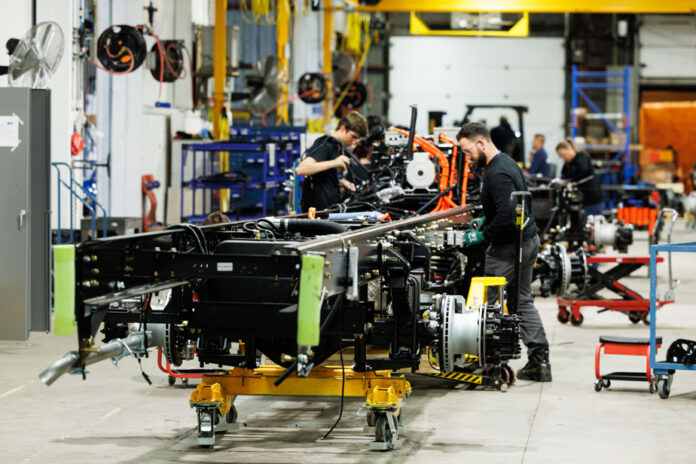The Lion Electric Company finds a Quebec solution to bail out its coffers, but the manufacturer of electric buses and trucks must agree to high interest rates while the specter of dilution still hangs over existing shareholders.
Nevertheless, under current conditions, the company’s president and CEO, Marc Bédard, believes he has been able to obtain stability for five years.
“It’s a tough market to fundraise everywhere,” he said in a phone interview. There are two groups, one from the public sector and the other from the private sector. This demonstrates the trust placed in us. We know that the cost of debt is higher than we would like, but [the rates] are not out of the market. »
The Quebec state is participating in this round of financing with Investissement Québec (IQ), its financial arm. The Crown corporation, the Fonds de solidarité FTQ and Fondaction lend $98 million (US$74 million) in exchange for convertible debentures at an interest rate of 13%. Secondly, Lion offers non-convertible debentures to the Saputo family, through the Mirella and Lino Saputo Foundation, as well as to Groupe Mach, in exchange for 90 million. These two lenders also obtained warrants allowing them to acquire 22.5 million shares at $2.81 per unit.
“It’s very expensive,” says the firm’s president, in a telephone interview. “It’s nice to see that our Quebec institutions and two families are supporting a local business. But I think there was a significant liquidity risk for shareholders. »
On the Toronto Stock Exchange, investors nevertheless reacted favorably on Monday. On the Bay Street trading floor, the company’s stock rose 7.2%, or 20 cents, to close at $2.98.
More than two years after going public, the Saint-Jérôme-based company is still posting operational losses. It expects to spend about $87 million (US65 million) this year on its U.S. assembly site in Illinois and its battery plant in Mirabel.
At Groupe Mach, the transaction is the “best of both worlds”, according to its president and founder, Vincent Chiara.
“Lion is a great Quebec story, but we also get the best of both worlds,” says the businessman. We will have flexibility. We will keep the debt until maturity and we will have the possibility of becoming shareholders. »
Several financial analysts anticipated a dilution of existing shareholders so that Lion would be able to finance its activities. In the short term, we are not witnessing a massive share issue, but the company’s long-term debt, which stood at 155 million as of March 31, will increase.
Moreover, with the options offered to IQ, the Fonds FTQ, Fondaction, the Saputo family and the Mach Group, a dilution seems inevitable. Up to 89.4 million securities could be issued to members of the group of lenders, notes Benoit Poirier, at Desjardins Securities.
“This represents approximately 40% of the number of undiluted shares currently outstanding,” the analyst wrote, in an emailed note to clients.
Asked about this question, Mr. Bédard replied that it is still too early to know if all these options will be exercised.
“I think the balance is right,” he says. It is a good protection for the company and we avoid too much dilution at the present time. »
In addition to the 188 million collected, Lion was able to postpone for one year, until August 2025, the maturity of certain debts. This will give him extra flexibility.
This is not the first time that the financial arm of the Quebec state has offered money to Lion. He has already granted him a loan of 50 million for the construction of his complex in Mirabel. Nearly 20 million were also injected into the company’s share capital as part of its arrival on the financial markets.
In the first quarter ended March 31, the company lost $15.6 million. Its revenue, however, was $54.7 million, more than double the same period last year.















